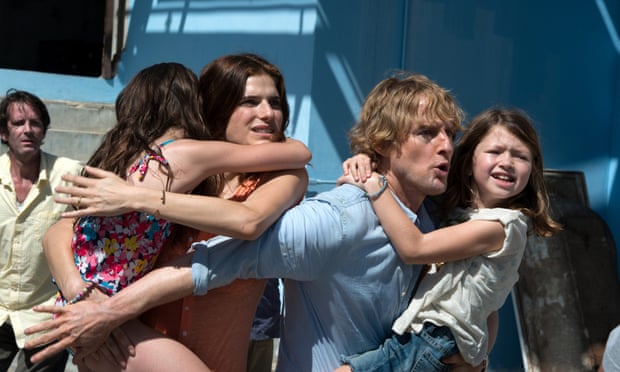
My biggest issue with "No Escape," a film that attempts to captivate audiences with its suspenseful mood and with the inclusion of several brutal and rather shocking execution scenes, is undoubtedly with its structure. Of course, this statement should not take you by surprise, especially if you are a faithful reader. (Remember, it is not what the picture is about that makes it notable or worthless, but how it is about it.)
Now, here is a film that obviously works well within the thriller genre. It relies heavily on scenes brimming with intensity, and on moments that are infused with emotional involvement, and, for the most part, they work. (In fact, the success of many of the above-mentioned scenes is surely contingent on the execution of these so-called "intense moments." I wouldn't exactly call hiding from a bad guy behind a locked door the quintessential conveyance for suspense, but it works.)
"No Escape" somehow even reminds us of the classic picture by the name of "Die Hard," as its plot centers on the dramatic overtaking of a hotel--albeit under different circumstances--and on the journey of a single man trying to protect his loved ones. Yet, despite all of its strong points there is one minor miscalculation that unravels the entire continuity of the film. I'm afraid director John Dowdle ("Quarantine," "Devil," "As Above, So Below"), who also contributed to the script, is still learning the ropes.
Here's the rundown: Jack Dwyer (Owen Wilson), your average American businessman, is beginning a new life (and a prominent new role at his new employer) in an unknown region of Southeast Asia with his wife and two daughters. However, unbeknownst to Dwyer, there have been numerous political uprisings (culminating in the assassination of the ambiguous country's prime minister), which just so happen to carry over to the streets and to the hotel in which Dwyer is staying. Enter Hammond (Pierce Brosnan), an undercover mystery man who keeps Dwyer's family out of harm's reach on more than one occasion. And here rests the previously mentioned error of judgment.
There is a scene in which Hammond (after rescuing the Dwyer family a second time) admits to Jack that he is really the antagonist in the whole situation. Apparently, he works for a company whose main ambition is to infiltrate these smaller countries and to essentially land grab for financial benefit. This not only compromises the viewer's antipathy toward the rebels--but after Hammond explains that they are simply trying to protect their families and homes--it becomes evident that maybe we shouldn't be blaming the insurgents at all. (Sure, there is no justification for lining up a group of individuals only to run them down in an automobile; however, the record has shown that some of the most successful revolutions and resistances to occur in human history have been fueled by aggression and bloodshed.) Overall, however, it would have been best to leave this tidbit of knowledge out considering its ill-effect on the viewer's animosity toward who the film wants us to dislike: the rebels.
Additionally, Brosnan's role, which was clearly thrown in to give the picture small spurts of action, hurts the integrity and allure of Jack Dwyer; the latter does a considerable job being resourceful and protecting his family during the overtaking of this hotel by these freedom fighters, and in the streets of this chaotic area, only to be outdone by this peculiar showman time and again. We become involved with this character simply because he is very much like the average Joe and because we can imagine ourselves in his position during this time of crisis. (Dwyer's actions unquestionably align with what most individuals would do under the same circumstances.) Yet, once this Hammond character swoops in, Dwyer becomes nothing more than a helpless shell of himself, and he surrenders his hero status to a role that should never have been put down on paper. (The film would have been much better off showcasing Wilson as the sole lionheart.) This is not to mention a reference to Brosnan's famed role as James Bond, which arguably becomes the most poignant scene in the entire film. Poignant in the sense that we remember James Bond films to be products of refined taste, which "No Escape" distinctly is not.
Also not helping the cause are a number of sequences characterized by poor direction and by an even worse display of editing competence. (This is in reference to our action "spurts"--which ultimately suffer from the erratic and unflattering nature of the hand-held camera--and to the many editorial cuts that simply serve no purpose.) Any attempt to coax the viewer into believing this suspenseful atmosphere comes off as silly and forced. How many times are we to be bombarded by slow-motion in an effort to make the scene more dramatic? Nevertheless, Owen Wilson, traditionally an actor of comedy, deserves some of the blame here as well. (There are a handful of scenes that require Wilson to convince his on-screen wife that trouble is near and that they have to get moving, so to speak. However, it is these moments where Wilson is really trying to convince us that he is fit for a role in this type of film. I was not only unimpressed, but I found Wilson to be rather unconvincing in scenes where sincerity was warranted the most.)
Upon my exiting of the theater, I decided to take another glance at the current docket of pictures that were playing and couldn't help but notice titles such as "The Transporter Refueled" and "Hitman: Agent 47." Titles that allude to the current state of the film industry; it is all spectacle and no brains. Art season cannot come soon enough.
No comments:
Post a Comment